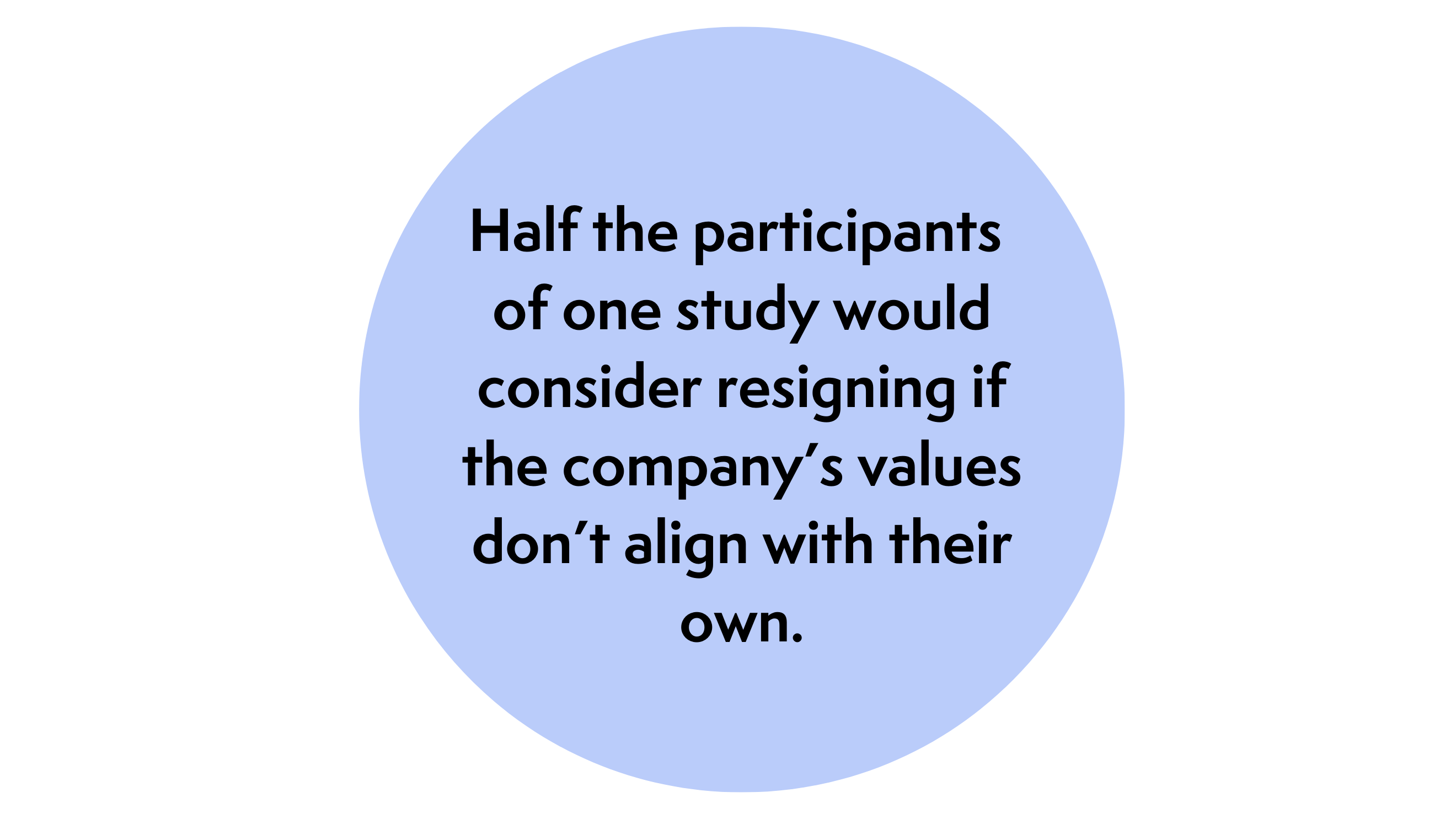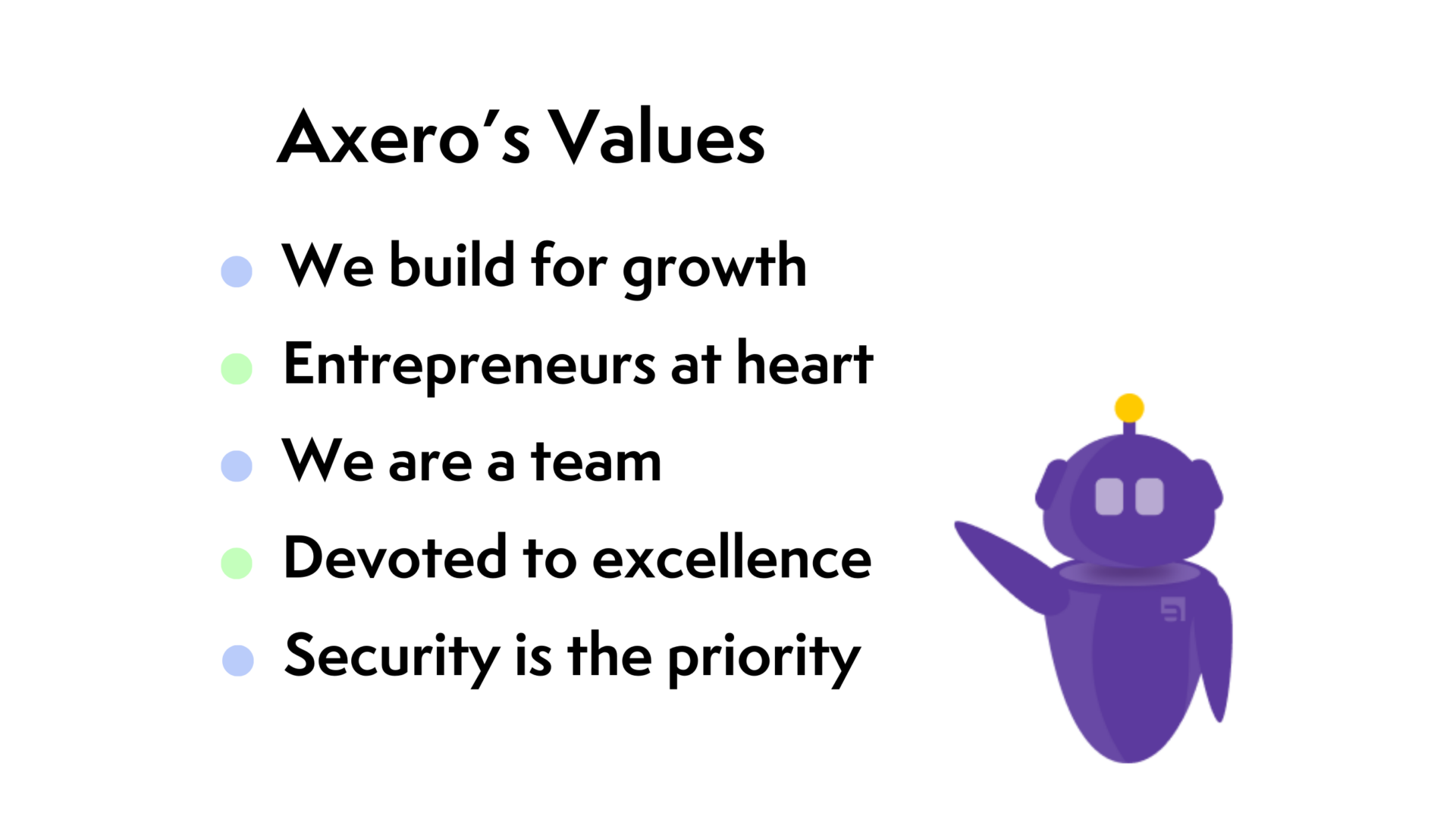Company values should be more than an empty statements said in recruitment, they need to matter. Establishing the values that you want your teams and the wider company to follow can be a valuable way to instill the types of behavior that you want to be a key part of any employee’s conduct.
Aligning your company in this way can be vital for creating a happy and engaged workforce. Research from Gallup in 2023 discovered that only 33% of employees were engaged with their workplace compared to 36% in 2020. Employees also felt less clear about expectations, lower levels of satisfaction, and less connection to the company’s mission or purpose compared to four years ago.
While establishing and promoting company values will not fix every single issue your teams are facing, it can be the glue that holds everyone together. Let’s take a closer look at core values, why you need them, and some examples to get you thinking about what might work best for your business.
What are company values?
Company values are a set of principles that give clear indicators of the mission and vision of an organization. Core values represent the principles that are the heart of company culture and can be used to set a path for the aspirations of the company. Your workforce is made up of different people but the core values are the unifying force that brings everyone together.
Why do we need company values?
Sometimes corporate values can feel like empty statements with nothing behind them, but they are incredibly important for establishing a presence. Strong company values should, obviously, be reflected in the conduct of the organization and in the actions of each of its leaders and teams.
Core company values are often displayed across websites, part of the corporate communications strategy, or in employee value proposition statements. It is incredibly important that a business actively communicates their company core values. Though they should be supported in general, they will primarily have three key audiences:
1. Recruitment
A company’s core values should be shouted about loudly and proudly on any and all recruitment pages. Potential candidates don’t just want a paycheck and a PTO allowance anymore; particularly due to trends from Gen Z, they now want to work for a company that values them, and that they are proud to call their employer.
This is why most companies have a small section about their core values either on each job advert or as part of their wider career portal. A pretty common interview question will also see the interviewer ask the candidate what they know of the company values and if they can give an example of a time that they demonstrated this value in a previous role.
So, company values are not only used to attract like-minded candidates but also as a guide to ensure that any candidate has done their research and understands what the company is all about.
2. Engagement and retention

So, you have attracted a fantastic worker to your company thanks to your corporate values statement. Now, you need to keep them!
According to one survey, half the participants would consider resigning if the company’s values don’t align with their own, and a third have already done so. Companies need to prove that these little principles called core values are not just hot air; they are real and are a key part of a company’s wider culture and way of working.
3. Customers
Finally, a company’s core values can play a massive role in attracting the right customers and clients. After all, many consumers nowadays want to buy from ethical brands, and partnerships between companies built on shared values can prove to be incredibly strong.
If customers know what a company’s core values are before they make a purchase, that might help them decide whether or not they splash the cash. For example, some consumers are willing to spend 9.7% more, on average, for sustainably produced or sourced goods, as almost nine-in-ten (85%) report experiencing first-hand the disruptive effects of climate change in their daily lives, according to PwC.
30 examples of company values we should all embrace
OK, so we know what a core value is, but what are some strong company core values that a brand may want to have? We’ve listed some of the most common we see, but this is not an exhaustive list. There are many other qualities that people may wish to show at work!
1. Integrity
Acting with honesty and honor without compromising the truth. In no-blame cultures, this can be vital for maintaining peace.
2. Customer focus
Putting the needs and desires of customers at the forefront of business decisions. Maintaining the happiness and satisfaction of customers is of vital importance to any company. (Ours at Axero too!)
3. Innovation
Embracing new ideas, creativity, and approaches to drive progress and improvement. We always want to encourage innovative thinking and problem-solving from employees.
4. Respect
Treating everyone with dignity, fairness, and courtesy. Everyone deserves to be treated with respect, no matter their position in the company.
5. Excellence
Striving for the highest quality and continuous improvement in everything the company does. After all, when the employees thrive, so does the company.
6. Accountability
Taking responsibility for actions and their outcomes. Everyone makes mistakes, and it can be difficult to acknowledge that, so uplifting people to be accountable should be a common practice.
7. Collaboration
Working together across boundaries to achieve common goals. When we collaborate, we can achieve great things.
8. Sustainability
Committing to environmental stewardship and sustainable business practices. Many more companies wish to focus on sustainable practices and make them a key part of their everyday.
9. Diversity and inclusion
Valuing diverse perspectives and creating an inclusive environment for all employees. All employers need to set out robust DEI initiatives if they haven’t yet made moves to do so.
10. Transparency
Being open and honest in communication and operations. When people are transparent, whether it is about mistakes, intentions, or anything else that could disrupt a project, things can move forward and a solution can be reached more easily.
11. Passion
Showing enthusiasm and dedication in all the company does. When employees get behind a company’s mission and values, it makes an obvious difference on social media, to stakeholders and customers, and to potential candidates.
12. Community engagement
Contributing positively to the communities in which the company operates. Companies can either nurture the communities growing within them or give back to those around them.
13. Empowerment
Encouraging employees to take initiative and make decisions. An empowered workforce is a confident workforce.
14. Adaptability
Being flexible and responsive to change. The ability to swing and change can be massively beneficial to employees, and developing this skill early in their careers can help in the long run.
15. Ethical practices
Upholding strong moral principles in all business dealings. Everyone should aim for ethical business practices, regardless of the industry they work in.
16. Quality
Ensuring products and services meet the highest standards. Official quality standards in place can help everyone turn out work to the same quality.
17. Teamwork
Promoting collaboration and mutual support to achieve collective goals. Teams need to be able to collaborate and work well together for the most positive outcomes.
18. Learning and development
Committing to the continuous growth and improvement of employees. Employees need to be able to learn and grow to better themselves in their roles and their careers at large.
19. Empathy
Understanding and sharing the feelings of others. A very underrated core value that can benefit not just management but individual team members too.
20. Safety
Ensuring a safe, inclusive, and healthy environment for employees, customers, and partners. Everyone deserves to feel safe when they interact with the business.
21. Trust
Building and maintaining trust. Trust should be an imperative part of any business, with managers trusting that employees will complete their work properly, and employees trusting that managers will support them through any issues they may face.
22. Loyalty
Being faithful to commitments and relationships. Loyalty is incredibly important in business, with loyalty to teams and customers leading to great outcomes when correctly nurtured.
23. Professionalism
Demonstrating competence and reliability. Even in fun-loving and down-to-earth teams, there needs to be a level of professionalism.
24. Creativity

Encouraging original thinking and solutions. Even if people do not think of themselves as traditionally creative, they may still have some great ideas lurking in the back of their brain!
25. Efficiency
Optimizing resources and processes. Learning how to work with efficiency is an important skill set everyone needs to learn to develop.
26. Social responsibility
Acting in the best interest of society. Many companies now prefer to outline this in a full corporate social responsibility policy.
27. Gratitude
Showing appreciation and thankfulness. We all benefit from hearing gratitude every now and then.
28. Perseverance
Persisting in the face of challenges. Perseverance is another underrated core value that can pay dividends during a difficult or turbulent period for a team.
29. Humility
Maintaining a modest view of one’s importance. Even as a company grows and more success rolls through the door, it is important to keep a humble heart and mindset.
30. Fun!
Creating a joyful and enjoyable work environment. Remembering to have fun and love the job can be a massive motivation to many!
How to choose company values for your teams
The core values we listed above are just some of the many that you might choose for your organization. After all, no two businesses are the same. Even if they are in the same industry, they might target different demographics and may like opposing leadership styles.
Two companies might also be at completely different points in their journeys, and this might be reflected in each organization’s core values.
A start-up might have more snappy and dynamic values. They might focus on innovation, creativity, and forward thinking. Comparatively, a family-run business might put preference on supporting customers and recognizing employees.
If a company wishes to establish core values for employees, it needs to think critically both about the employees currently working there and the direction that they wish to move forward. Core values are a key part of company culture, and it is something that should not be dictated by market trends or what competitors are doing; a company should always make it unique to them.
What to include in your core company values
It can be tempting to choose a million different options for your company values. You might even think it will be a good idea to embrace all of the options we have listed above but, let us be the first to say it, you need to be selective!
Here are top tips to help you ensure that you craft the perfect list of strong values for your company:
- Short and snappy — Don’t choose more than seven unless you have good reason to, like making an acronym.
- Keep it clear — This is not the time to be vague; be clear and concise!
- Focus on the action — A good core value will give the employee an action to undertake or emulate.
- Allow space for reflection — The perfect company value will give employees a chance to reflect on their actions and conduct.
- Adapt and evolve — No company will hold the same set of values forever. Make sure there is space to change things as the business grows or changes.
How to implement new core values for your teams
So you now have your shiny new list of core values that you would like to introduce to your team. Unfortunately, someone’s gotta say it: a mass email probably isn’t going to be enough to get everyone on board. Like with other initiatives that you may want to introduce, there are a few careful steps you can take to ensure that everyone gets aboard the value train.
Ask the team
First things first, ask your teams what they think the core values of the company should be! Whether you are starting from scratch or you are working over a set of values as part of a rebranding, you should get the opinions of the team. They are the ones who support the company’s vision after all, and the values you pick should match those they hold themselves as workers and individuals.
It is easy enough to do, after all. You don’t even have to block out time for brainstorming sessions on your team’s calendar (though doing so can be a great way to make sure everyone is aligned!). Instead, sending around a survey on the company intranet can be a quick and easy way to gather thoughts.
Get constructive feedback
Questions like “Do you like working here?” or “Would you recommend working here?” might be great for management’s ego, but at the end of the day, it doesn’t give you anything specific to work from when choosing your company values. Don’t be afraid to dive in and ask the tough questions that will give you real data that you can work with.
It can be difficult to get the team to open up, but encouraging them to pass on constructive criticism can result in you getting a deeper understanding of how everyone views things.
Create values employees want
Your employees think the values should be honesty, drive, and fun. So why are you creating ones about efficiency and quality of work? Managers need to pay attention to what employees are actually saying, and what they believe the best values are. To have a strong employee experience that people want to be a part of, their insights must matter.
Then, you can sit down and see how these align with the overall business goals for the company and the values that would best support them. Even if they don’t align perfectly, there may be some middle ground that you can use to work towards a future supported by core values that reflect everyone’s thoughts and feelings.
Be prepared to evolve
No company is static over five, ten, or even fifty years of business. Things change as employees come and go, new products and services are launched, and new executives take the helm. The company will evolve over time, and its values might need to change too.
Keep the door open so employees feel like they can come forward with ideas for new core company values that might arise as things change around the workplace. This can be a great way to show that the organization is committed to evolution and change, and that new ways of thinking are always welcome.
Examples of company values we love
Nearly every company out there has core values listed somewhere on their site if you go hunting for them. Why not check out those of your favorite brands to see if they align with your personal values? In the meantime, we thought we would shine a spotlight on a couple of companies that we think are doing corporate values in just the right way!
HubSpot
HubSpot’s Culture Code does everything we think a great set of strong company values should do. It is clear, it is memorable, and they review it frequently to ensure that it is always in line with the overarching goals of the company and their employees.
They have even managed to arrange their values into an acronym; thus making it easy for everyone to remember. They say that the employees at HubSpot have HEART:
- Humble
- Empathetic
- Adaptable
- Remarkable
- Transparent
From these, we can infer the ideal type of person who works at HubSpot and what they bring to the table in a business setting. Each value is short and to the point, and it is clear what kind of culture is at HubSpot even without seeing photos or watching videos.
Canva
Canva sets out its values on its About page. Though they aren’t as snappy as HubSpot’s, they do speak to the overall vibe of the company, and what they expect from their employees. These values are clearly carried across other parts of Canva’s messaging to build a coherent and comprehensive image of the company at large.
Their values are:
- Be a force for good
- Be a good human
- Empower others
- Make complex things simple
- Pursue excellence
- Set crazy big goals
These all fit in well with the action-orientated and innovative reputation that Canva has built. Employees have something to aspire to, and the statements themselves are open to personal interpretation while acting as empowering influences.
Build your company culture and nurture your employees
Company values lay out expectations for how employees should conduct themselves, but they should also inspire and influence people to be the best they possibly can be. Ultimately, a company’s core values should form the pillars of a wider company culture.
A company culture is an incredibly important part of any workforce. After all, people don’t just come to work to complete tasks at their desks like robots! Employees want to know that their work is valued and that they can have fun alongside the more serious moments their teams might face. A good culture will attract the right talents, but it can also help retain them.
Axero offers the perfect platform for you to create a unique space for your culture to thrive. Our fully customizable intranet can be used to host internal messaging and communication, plus document management and more. But it can also be used as a space for your teams to come together to interact and have fun!
Your employees can use Axero to give shoutouts and badges to their colleagues, your internal comms team might send around a fun message to kickstart the week, or your leadership can break down barriers and engage directly with the rest of the organization. You could even challenge everyone to share a funny picture of their pets! Whatever you want to make of it, we can help you create it. And your company core values can be shared front and center on your intranet’s home screen.
Join organizations like Toyota, Johns Hopkins University, and Benjamin Moore in acing their company values and workplace culture with Axero. Get your personalized demo today!






















 info@axerosolutions.com
info@axerosolutions.com 1-855-AXERO-55
1-855-AXERO-55


